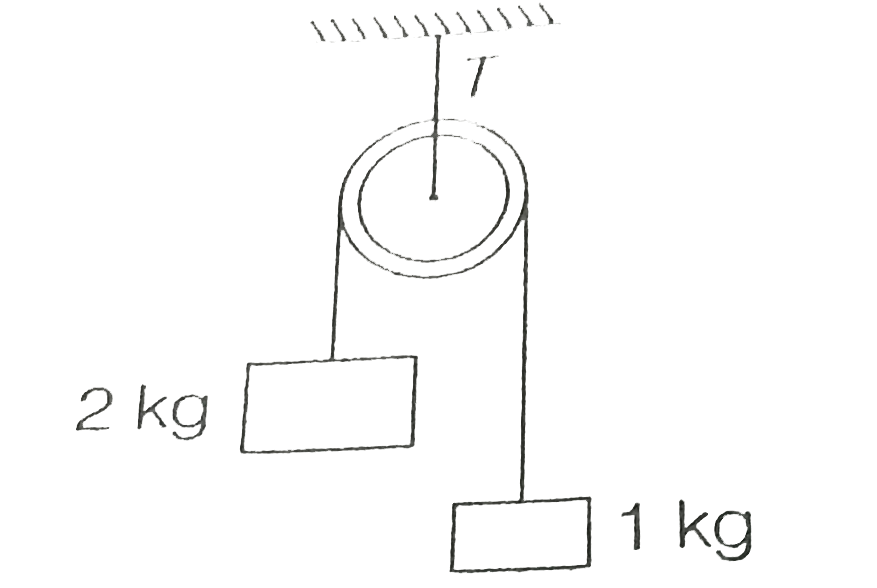These questions consists of two statements each printed as Assertion and Reason. While answering these question you are required to choose any one of the following four responses
Assertion In the system of two blocks of equla masses as shown, the coefficient of friction between the blocks (μ2) is less than coefficient of friction (μ1) between lower block and ground. For all values of force F applied on upper block, lower block remains at rest.
Reason Frictional force on lower block due to upper block is not sufficient to overcome the frictional force on lower block due to ground.

If both Assertion and reason are true and the reason is a correct explanation of the assertion.
If both Assertion and reason are true and the reason is not the correct explanation of the assertion.
if assertion is true but reason is false
if assertion is false but reason is true
The correct Answer is:A
(a) (f2)max=μ2mg
(f1)max−μ1(2m)(g)
Since (f1)max>(f2)max
Lower block will not move at all.
Similar Questions
These questions consists of two statements each printed as Assertion and Reason. While answering these question you are required to choose any one of the following five responses.
Reason: In an eleastic collision, the linear momentum of the system is conserved.
View SolutionThese questions consists of two statements each printed as Assertion and Reason. While answering these question you are required to choose any one of the following four responses
Assertion The weighing machine measures the weight of a body.
Reason Weightlessness means the absence of weight.
View SolutionThese questions consists of two statements each printed as Assertion and Reason. While answering these question you are required to choose any one of the following four responses
Assertion Friction opposes motion of a body.
Reason Static friction is self adjusting while kinetic friction is constant.
View SolutionThese questions consists of two statements each printed as Assertion and Reason. While answering these question you are required to choose any one of the following four responses
Assertion In the shown figure, tension T connected to the ceiling is 10N<T<20N

Reason System is not stationary.
View SolutionThe question consist of two statements each, printed as Assertion and Reason. While answering these questions you are required to choose any one of the following four responses:
Assertion: Charge on the complex of ferric ion with EDTA is minus one.
Reason: EDTA is a hexadentate ligand.
View SolutionThese questions consist of two statements each, printed as
Assertion and Reason. While answering these questions you are
required to choose any one of the following four responses:
Assertion: [Co(NO2)3(NH3)3] does not show optical isomerism.
Reason: It has a plane of symmetry.
View SolutionThese question consists of two statements each printed as Assertion and Reason. While answering these question you are required to choose any one of the following five responses.
Assertion: Emissive power of a perfectly black body is one.
Reason: Absorptive power of perfectly black body is one.
View SolutionThe question consist of two statements each, printed as Assertion and Reason. While answering these questions you are required to choose any one of the following four responses:
Assertion: NF3 is weaker ligand than N(CH3)3.
Reason: NF3 ionizes to give F− ions in aqueous solution.
View SolutionThese questions consists of two statements each printed as Assertion and Reason. While answering these question you are required to choose any one of the following four responses
Assertion Static friction acting on a body is always greater than the kinetic friction acting on this body.
Reason Coefficient of static friction is more than the coefficient of kinetic friction.
View SolutionThese questions consists of two statements each printed as Assertion and Reason. While answering these question you are required to choose any one of the following four responses
Assertion In the diagram shown in figure, string is massless and pulley is smooth, Net force on 1 kg block is 103N.
Reason Net force on both the blocks will be same.

View Solution
